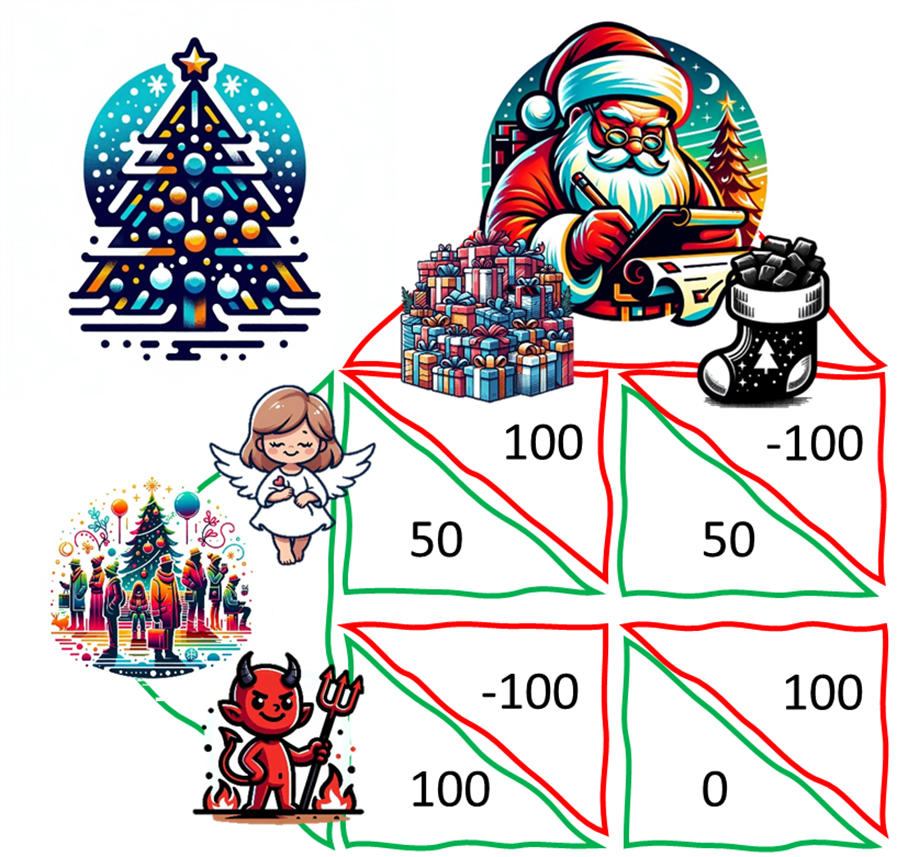
With the help of game theory, Dr. Florian Bartholomae, Professor of Economics at Munich Business School, explains why it is difficult from an economic perspective to deal with Santa and the presents.
Every year at Christmas time, we eagerly await the presents from Santa Claus. As we all know, he checks his list twice to find out who has been naughty or nice and distributes presents or coal accordingly. However, due to the poor carbon footprint of coal, he has recently decided against this and simply gives nothing at all. On the other hand, most people find it quite difficult to meet these high standards, as always being nice can also be quite boring.
With the help of game theory, we now want to explore how Santa and we will behave. We are particularly interested in the predicted outcome, i.e., whether there will be presents or not. We have two players here, Santa and us. Both players have different interests: Santa wants to encourage good behavior, we like to receive presents, but we don’t always want to be nice. We therefore have two strategies: to be nice like an angel or naughty like a devil. Santa, on the other hand, can bring presents or fill our stockings with coal. Depending on which strategy is chosen, the situation is evaluated differently – this is expressed by the numbers in the figure. The higher these payoffs are, the better it is for the player.

Let us now consider what happens in this game: Suppose we have not been quite so nice, but Santa has decided to give us a present – so we are at the bottom left of the matrix. Can this be the solution to the game? The usual solution concept, the so-called Nash equilibrium, requires that in an equilibrium none of the players has an incentive to deviate from it. Is this the case with naughty and present? The answer is no! Santa will certainly not want to reward naughty behavior but will instead use coal to show us that our behavior was not okay – we can see this in the matrix by the fact that the payoff when we behave naughtily is higher for Santa with coal (100) than with a present (-100). Have we now found an equilibrium between naughty and coal? Unfortunately, again, no. This time it’s us who won’t be satisfied. Who wants to receive coal? So, we would prefer to be nice (50 instead of 0) to show Santa that he has made a mistake. Thus, we can already imagine that being nice and getting coal is not an equilibrium as well. Santa will of course want to reward our good behavior with a nice present. We end up in the wonderful situation of us being nice and receiving a present. A wonderful equilibrium…. Which, unfortunately, is also not an equilibrium: why not want everything: Fun and presents? So, we will want to deviate, which brings us back to naughty and present. In other words, at the beginning of our story. What does that mean?
It means that, unfortunately, there is no equilibrium here, at least not in pure strategies such as we have here. The game described here is the so-called inspection game (Bartholomae/Wiens 2020). Other examples of applications are, for example, the behavior between a passenger who can decide between buying a ticket and fare evasion and a ticket inspector who can check or not. In the economic context, the monitoring of employees is also an example of an application: the employee has the choice of being hard-working or lazy and the manager can monitor their behavior or not. In all these cases, we come to the same conclusion: there is no equilibrium in pure strategies.
However, there is in fact an equilibrium in mixed strategies. In such strategies, the players do not choose their strategy with certainty, but only with a certain probability. In our example, there would be an equilibrium if we are nice with a probability of 50% and Santa gives us a present with a probability of 50%. How do we determine this probability? If Santa always chooses a certain strategy, we have the best answer: if he gives presents, we want to be naughty, if we get coal, we want to be nice. But at exactly 50%, our expected payoff is the same in both cases.
Thus, let us summarize: If you haven’t received a present from Santa this year, it’s not necessarily because of you, but only because of the poor outcome of this Christmas lottery! With this in mind: Merry Christmas and a happy new year!
Literature:
Bartholomae, FW; Wiens, M: Spieltheorie – Ein anwendungsorientiertes Lehrbuch, Springer Gabler: Wiesbaden, 2. akt. und erw. Aufl., 2020. – Englisch translation forthcoming in 2024!




